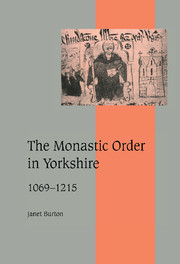Book contents
- Frontmatter
- Contents
- Preface
- List of abbreviations
- Table of monastic foundations in Yorkshire, by order, congregation, or type
- Map 1 The Black Monks and the Regular Canons in Yorkshire
- Map 2 The Yorkshire Cistercians and their families
- Map 3 Nunneries in Yorkshire
- INTRODUCTION
- PART I THE DYNAMICS OF EXPANSION
- Part II THE LIFE WITHIN AND THE WORLD OUTSIDE
- 6 THE MONASTIC WORLD
- 7 FOUNDERS, PATRONS, AND BENEFACTORS
- 8 MONASTERIES AND THE LANDSCAPE
- 9 FINANCING THE MONASTERY: THE MANAGEMENT OF ECONOMIC RESOURCES
- 10 CULTURAL INFLUENCES AND IDENTITIES
- Conclusion
- Select bibliography
- Index
- Cambridge Studies in Medieval Life and Thought
7 - FOUNDERS, PATRONS, AND BENEFACTORS
Published online by Cambridge University Press: 23 November 2009
- Frontmatter
- Contents
- Preface
- List of abbreviations
- Table of monastic foundations in Yorkshire, by order, congregation, or type
- Map 1 The Black Monks and the Regular Canons in Yorkshire
- Map 2 The Yorkshire Cistercians and their families
- Map 3 Nunneries in Yorkshire
- INTRODUCTION
- PART I THE DYNAMICS OF EXPANSION
- Part II THE LIFE WITHIN AND THE WORLD OUTSIDE
- 6 THE MONASTIC WORLD
- 7 FOUNDERS, PATRONS, AND BENEFACTORS
- 8 MONASTERIES AND THE LANDSCAPE
- 9 FINANCING THE MONASTERY: THE MANAGEMENT OF ECONOMIC RESOURCES
- 10 CULTURAL INFLUENCES AND IDENTITIES
- Conclusion
- Select bibliography
- Index
- Cambridge Studies in Medieval Life and Thought
Summary
The monastic expansion in Yorkshire was in part a movement of the spirit, a response, by those who entered the religious life, to the rich variety and vitality of northern monasticism. However, for monasticism to flourish it needed patrons as well as recruits. Men and women established monasteries in order to obtain prayers for the salvation of humankind, and for their own security in particular; but there were other motivations. As Professor Southern remarked, monasteries ‘did not exist solely or even mainly for the sake of the monks who sought within their walls a personal salvation … [they] were founded and filled for political, social, and religious purposes of which we hear nothing in the Rule’. This chapter explores the explosion of monasticism in Yorkshire from the angle of those who established religious houses. How did founders choose the type of house to establish, or the monastery from which to draw a colony? Why did they sometimes go on to establish other houses or to endow monasteries founded by others? The particular circumstances of foundation have been discussed in chapters 1–5. The first part of this chapter brings together evidence to support the thesis that the monastic expansion in Yorkshire – which was essentially sponsored by baronial patronage although aspirations later percolated down to the middle orders of society – was a product of particular political, social, and tenurial circumstances which existed between 1066 and the close of the twelfth century; and that these factors, as much as spiritual vocation, determined the shape of the monastic order.
- Type
- Chapter
- Information
- The Monastic Order in Yorkshire, 1069–1215 , pp. 182 - 215Publisher: Cambridge University PressPrint publication year: 1999



